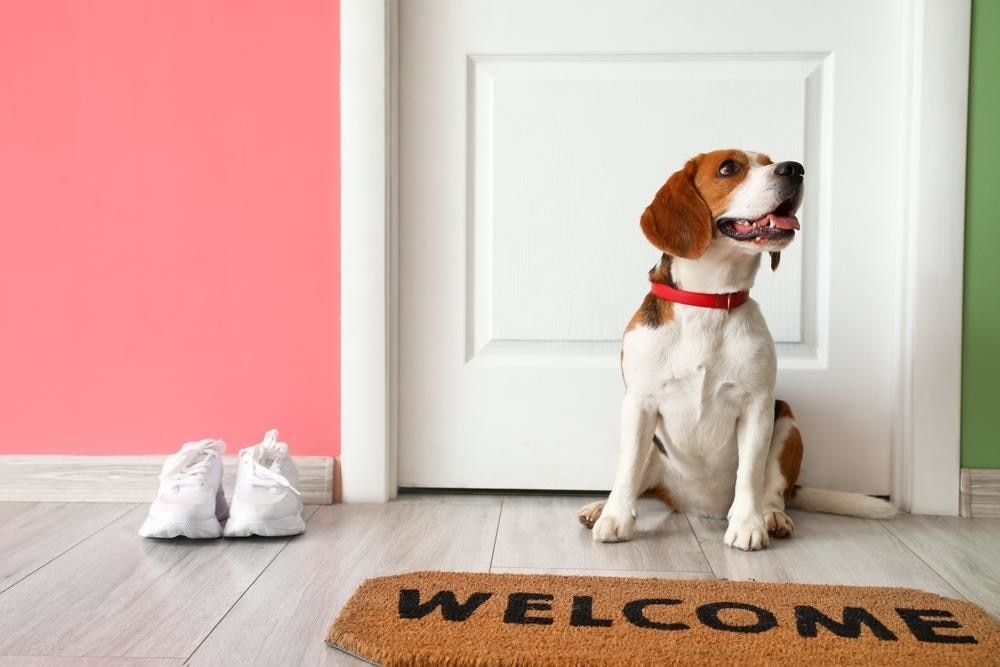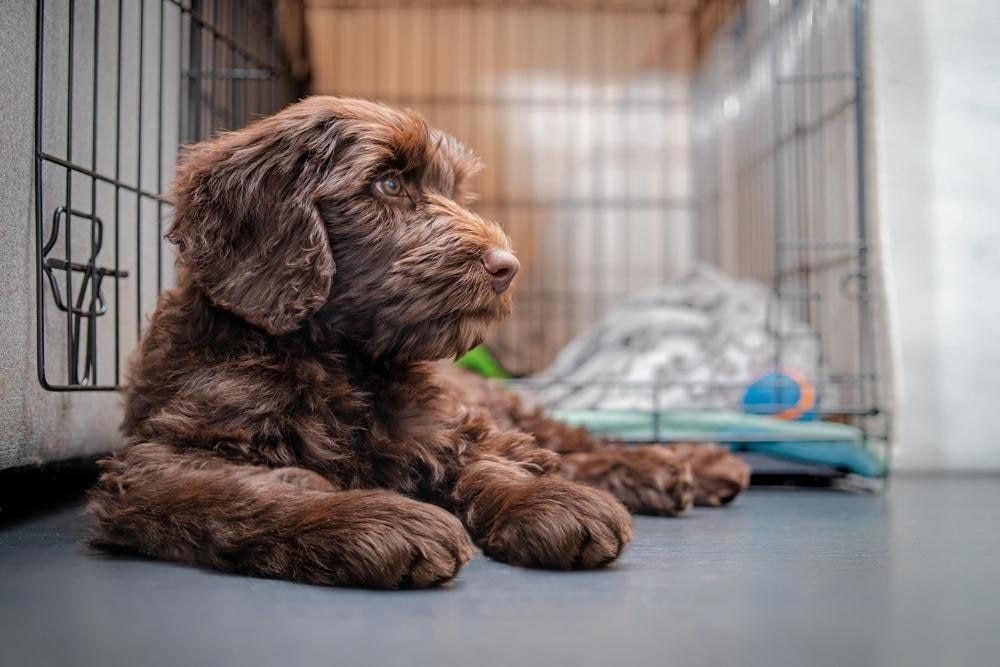

As a new or soon-to-be pet parent, you probably already know that bathroom training is one of the first things you'll do to help your puppy get acquainted with their new home. But how do you house train a puppy, exactly? You can show your pup the ropes in many ways. These 10 tips will get you started for how to potty train a puppy and set you both up for success.
1. Stick to a Potty Spot
Before you begin puppy potty training your new pal, decide where you'd like them to "go" outside of the house. If you have a yard, direct them to a location that's quick to get to from the door. Apartment-dwelling dogs should also be able to identify natural, easy-to-reach ground that isn't in the way of foot traffic or cars.
Once you've determined where you'll bring your dog during this training phase, make sure you take them to the same area every time they go outside to do their business. Dogs can smell their territory, so consistency is key when house training a puppy.

2. Learn the Signs of Needing to Go
Your new puppy might not speak the same language as you, but they'll try to tell you they need to eliminate in their own special way. Immediately bring your dog outside to their special potty spot when you see them:
Smelling their rear
Pacing in circles
Barking or scratching at the door
Sniffing the floor
Squatting
You'll need to act fast when you see any of these signs, so plan ahead. Keep a leash right at the door so you can usher your pup outside as soon as possible. Remember to guide your dog to the same spot every time they need to go. Once they learn where their special potty area is, they'll return to it on their own.
Keep in mind that by the time your pup shows the last sign on the list, it may be too late. Be ready to open the door anyway. This helps reinforce that their approved potty spot is available before they go in the wrong place.
3. Make Meal Time the Same Time
When house training a puppy, keep all meal and snack times scheduled. This is helpful for two reasons. First, scheduled meals help teach your dog when they can expect to eat throughout the day. Second, if you're feeding your dog at specific times, you can bring them to their potty spot directly afterward with the expectation that they'll be ready to go soon after they finish eating.
4. Watch the Water Bowl
If your dog tends to drink a lot of water, chances are they'll urinate frequently as well. To minimize accidents, take your puppy out shortly after drinking so they're in the right place at the right time.
5. Make a Puppy Potty Training Schedule
Take your pup out first thing in the morning, after naps, after eating or drinking and anytime you see cues indicating they might need to go. Many dogs produce a bowel movement within 30 minutes of a meal. If you have a young puppy, take them out every hour to avoid accidents until you get a better idea of how often they do their business.
Training Schedule by Age
Generally, puppies can "hold it" for about one hour for every month of age. Two-month-old puppies can hold it for two hours, three-month-olds for three hours and so on. However, this will vary between puppies. Large breeds typically have a greater capacity to wait, while small breeds with smaller bladders often need more frequent potty breaks. Always give your dog a potty break before you go to sleep so they won't wake you at 3 a.m. or surprise you with a morning deposit.
By seven months of age, most dogs can wait seven or more hours. By that age, they should have learned to tell you when they need to go outside.
6. Praise Your Pup
Everyone likes to know when they're doing a good job, and your puppy will thrive on this positive reinforcement, too. Whether you praise them with a treat or say "good job" while petting them, just make sure they know you appreciate their efforts to do things the right way. Consider naming the deed to teach a "go to the bathroom" command. You may prompt your pup to "take a break," for example, before getting to play.
7. Use a Crate
Pups don't like to eliminate where they sleep or eat. While most won't have a problem eliminating in one corner of a bathroom or laundry room and sleeping and playing in the rest of the space, crate training reduces the likelihood that they'll go inside. If you're unable to supervise your dog closely, confining them in their crate encourages them to let you know if they need a bathroom break since they won't want to mess up this area. If they go outside and play without eliminating, put them back in the crate when you return. Should they have an accident in the crate, they must live with it temporarily — a powerful lesson every pup should learn.

8. Address Accidents Calmly
Accidents are a natural part of house training. When your dog eliminates in your home, quickly and calmly redirect them outside to their designated potty spot. Punishing your puppy may make the situation worse and result in more accidents in the home.
Next, clean the area thoroughly. If your dog smells waste in your home, they'll be more likely to relieve themselves there in the future. Avoid ammonia, since it mimics the smell of urine. Bleach disinfects but won't eliminate odor, either. When cleaning the soiled spot, use an enzymatic cleaner or odor neutralizer designed specifically for pet waste. Keep your pup away from the area while it dries.
9. Add a Training Bell
Once your puppy understands the concept of an approved potty spot, add a training bell to help them tell you when they need to go. To help them make the association, ring the bell each time you take them outside. Many pups quickly learn to "touch" the buzzer button or training bell themselves when rewarded by access to the outdoors. Note that some puppies may decide to use the bell for fun outdoor playtime, so adjust accordingly.
10. Adjust to Varying Situations
Excited, stressed or scared dogs may be more prone to accidents in the home, even if they're otherwise well-trained. For example, puppies may squat when meeting new people or pets out of excitement or submission. Give them potty breaks before meet-and-greets to avoid a mess.
If you're traveling with your puppy, schedule plenty of potty breaks during road trips. If you decide to leave your dog behind when you travel, provide step-by-step instructions to the house sitter or boarding facility to maintain consistency. If you move to a new home, start over with house training. Restrict your puppy to one area of the house, show them the new potty spot and reward them when they do the right thing.
Many dogs dislike eliminating when it rains or object to squatting in snow. First experiences with cold and rainy weather can scare a pup, but even adult dogs prefer to potty in comfort. Keep an umbrella handy to offer some weather protection. Shovel out a path to your pup's preferred potty spot so they can relieve themselves without exposing their tail to the icy cold ground. Doubling up on treats can help puppies learn that going potty in bad weather gets extra rewards.
Keep in mind that certain health conditions can result in incontinence issues. If your normally house-trained dog has more than one accident, check with your veterinarian to rule out any underlying health issues.
Personalizing Your Approach to How to Potty Train a Puppy
So, how do you house train a puppy? In general, the best approach depends on your dog's unique needs. Not all dogs learn at the same speed. Some puppies understand house training and become pros by eight or 10 weeks of age. Other pups, such as toy breed puppies like Pomeranians, may take longer to understand what you expect and may not demonstrate consistency until they're a few months old. In most cases, with your patience, praise and consistency, all dogs can learn to eliminate in an approved location.






















